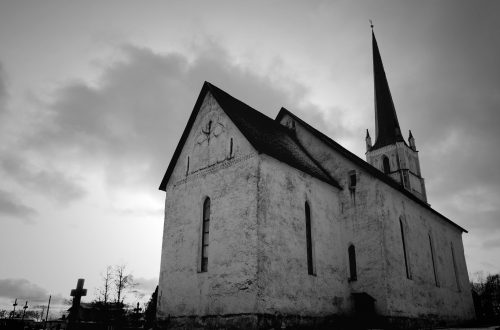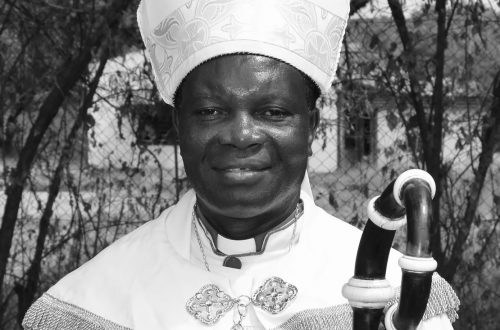 David Mills is the former editor of Touchstone magazine and is one of the most compelling writers I know. He is a Roman Catholic, but I see him about once at year the annual meeting of the Evangelical Theological Society (ETS). He attends not as a member, but as a sympathetic observer.
David Mills is the former editor of Touchstone magazine and is one of the most compelling writers I know. He is a Roman Catholic, but I see him about once at year the annual meeting of the Evangelical Theological Society (ETS). He attends not as a member, but as a sympathetic observer.
If there’s one thing I like about David, it’s that he knows that there are differences between Evangelicals and Catholics and that he thinks we should all be honest about them. In an age in which glossing over such distinctions is the order of the day, I find that kind of clarity refreshing indeed.
David recently wrote an essay for insidecatholic.com in which he sizes up the Evangelical Theological Society. He tweaks us pretty good, and he does so in ways that I think are pretty insightful for an outsider (or even for an insider!). He writes,
“The [evangelical] movement is broadening, inevitably and unstoppably, because almost every member is attached to the title, the community, and (to some extent) the heritage, but many are also attached to new theologies and causes that stretch the movement further than many others think tolerable…
“The movement and the identity were once so closely intertwined that no one noticed the distinction, but now those who still identify with the movement — and with each other as members of the movement — have diverged greatly in theology, and will keep diverging, with no end in sight. The title still has value in their world, so few are going to give it up.
“The divergence between members and the resulting expansion of their movement’s effective self-understanding is the kind of thing that happens so incrementally that even those who notice the growing differences don’t want to make a fuss about them, especially as doing so would do no good. No one is going to expel an old friend because he’s moved a few feet outside the pale, even if he seems intent on going further. Besides, the group still has a clear identity in relation to the rest of their world, the world of American seminaries and divinity schools.”
I don’t know about you, but I’d say he’s got us pegged. The last paragraph of David’s piece consists of an oblique reference to our efforts to amend the doctrinal basis of the ETS. He writes,
“An effective definition of ‘Evangelical’ — one that lets them decisively settle the matters that divide them — is pretty much unachievable in the ETS as now constituted. It can only be found by a degree of doctrinal specificity many don’t want, and one that, at this point, couldn’t be reached anyway without coercing or expelling a large minority…
“I am cheering for my friends among the traditional Evangelicalsto prevail in the struggle to define the ETS, though I don’t think they will be successful, given the current political realities. But I hope and pray they will, because they are, perhaps unexpectedly, the most fruitful Evangelicals for a Catholic to talk to.”
I couldn’t agree more with David about what is needed in the ETS—more doctrinal specificity. For that reason, I still think our effort was worth the try, even though it didn’t pass in the end. I’m hopeful that something yet will.
The rest of David’s essay is a must-read. Go read it now:
“What Does ‘Evangelical’ Mean?” – by David Mills (InsideCatholic.com)




6 Comments
Don Johnson
What does the label “evangelical” mean and what do people want it to mean? And what does God want?
For me, I claim to be one and it means I am not EOC or RCC, and among protestants, not fundamentalist nor liberal but somewhere between. But this is a lot of definition in terms of what I am not.
To further confuse things, some other evangelicals might consider me liberal since I am egal. (I have been called such in some forums.)
So why do I think I am evangelical?
First, I claim to be born again, I have a personal relationship with God.
Second, I accept the (protestant)Bible as the word of God.
Third, the Bible trumps tradition, experience, and nature in revealing God to me. All 4 influence my faith, but the Bible is preeminent.
jeff miller
Denny,
To me this is a thought provoking subject and post.
I would add that the Father of Jesus is sizing up Catholicism, Evangelicalism, as well as something men have selectively created that they call “church history” and he may not be sizing it up according to a majority opinion.
Yours,
Jeff
Francis Beckwith
If I’m not mistaken, David Mills is not a “Roman” Catholic. He is, I believe, a parishoner of an Anglo-Catholic parish in communion with the Holy See. (Again, I could be wrong about this).
“Roman” Catholic refers to those Catholics–who are in the vast majority–who are part of the Latin rite. There are many other Catholics who are not Roman Catholics though in communion with Rome.
This is a subtle distinction, but often missed by people who refer to the theology of the catechism as “Roman” Catholic. It isn’t. It is Catholic theology embraced by both Roman and non-Roman Catholics whose churches are in communion with Rome.
Don Johnson
I am confused. My understanding was the Roman Catholic churches did not have to use Latin mass anymore.
Wesley
Latin Rite doesn’t mean latin language Necessarily. It is referring to “genealogical” development of the liturgy.
The “Latin Rite” is the set of liturgical radiations, liturgies and rituals that developed in the Latin Speaking West.
For instance, there are Eastern Rite Catholics who are part of the See of Rome but use the Eastern Divine Liturgy and not the Mass. They look like Eastern Orthodox (Sign of the Cross is eastern, more icons then statues, ect) Churches and have much theologically in common, but are also theologically Roman and are under the See of Rome, not Constantinople.
Some Anglo-Catholics who are also under the See of Rome instead of Canterbury use a modified version of the Prayer Book Eucharist, and consider themselves to be connected to the old Rite of Sarum or something similar.
David Mills
My friend Frank Beckwith is wrong. I am a member of a plain old run-of-the-mill Catholic parish outside Pittsburgh.
Thank you to my friend Denny for the very kind comments.